#anti anti zutara
Text
The Fortune in The Fortune Teller
This is an isolated look into this specific episode.
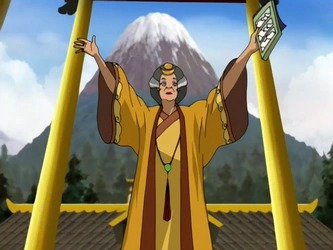
The Fortune Teller is the 14th episode of book 1 of Avatar: The Last Airbender. It is famous for supposedly developping the show's romantic subplot between Katara and A\ang. The episode does two things: A\ang attempts to flirt with Katara, and Katara is finally willing to consider him as more than just a friend.
However, I believe that this episode could have masterfully foreshadowed the pair not getting together in the end. In this essay I will detail how each step the episode takes towards a Kat@ang endgame is actually foreshadowing the opposite.
1. Katara and the Nature of Destiny
In the beginning, the Gaang meets a person getting attacked by a bear. He is acting incredibly passive, simply dodging the bear's attemps at his life. Then, A\ang and Appa interfere to help the man. When the Gaang questions him on why he was so passive, he says it's because the Fortune Teller told him he'd have a safe journey. They then have the following exchange:
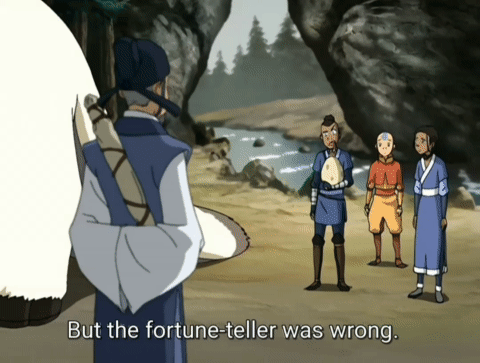
The man's logic is obviously flawed. If the Gaang didn't interfere, if the man continued to passivaly dodge, the bear would have attacked him. Fortune and destiny come from agency – from actively shaping them.
However, Katara is delaited at the prospect of seeing the future. Her and the Gaang go to meet the Fortune Teller, Aunt Wu. Aunt Wu tells her she'll marry a very powerful bender. Later, she comes back asking more details about her future husband. Remember her excitment, fantacising about her future husband:
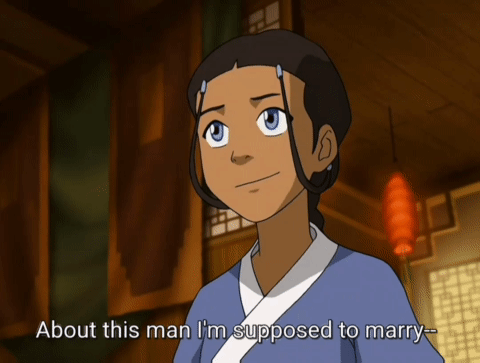
After that, Katara becomes somewhat reliant on Aunt Wu's prophecies. She goes as far as to ask her what she should eat.
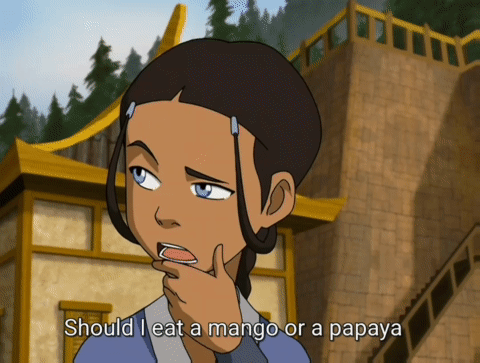
And she obeys her "prophecy", despite not wanting to. She became like the man from the beginning. She knowingly follows the fortune even though it doesn't make sense. She had given up on forging her own destiny.
Although by the end of the episode, she is no longer in this state of reliance, she still believes in the prophecies. Then, Sokka says that A\ang is a very powerful bender. This reminds her of what Aunt Wu said about her future husband. I don't want to cherry pick, so I took 4 different pictures of her face when she realizes A\ang might be the powerful bender she is to marry:
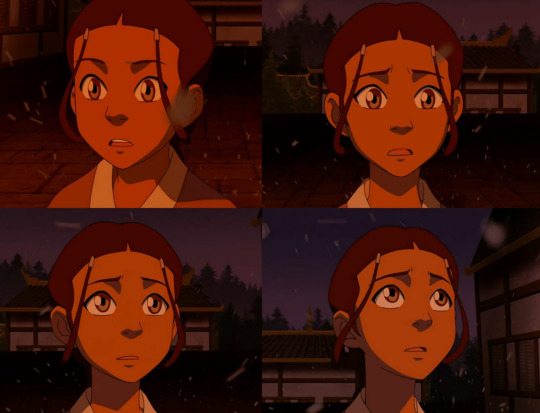
With the look in her eyes, with her mouth tilted down and with the ominous music, this could easily be read as disappointment. Especially when remembering how she fantacized about the powerful bender earlier in the episode. She doesn't smile, but looks concerned. As if she doesn't want this. Earlier in the episode, she says this:
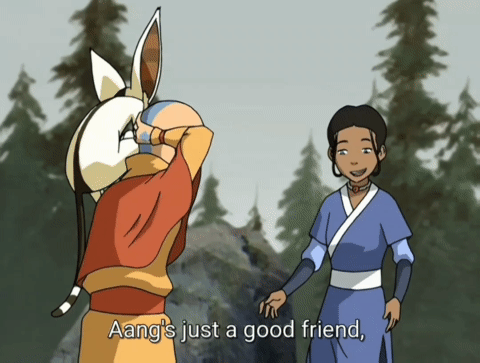
A\ang is like the papaya. The fortune says he's right for her, but Katara doesn't want him. Now, she isn't like the man, passively dodging the bear attacking her. She shouldn't sit and wait for the prophecy to come true point blank. She has the agency to shape her own destiny and not to choose A\ang as her future husband.
2. A\ang, Meng, and First Crushes
In this episode we're introduced to a girl named Meng. Aunt Wu told her she'd end up with someone like A\ang, and so she developped a one sided crush on him. Throughout the episode she attempts to talk to him, all to no avail. Because A\ang is not interested in her.
Interestingly, her one sided crush is directly paralleled to A\ang's crush on Katara.
Exhibit A:
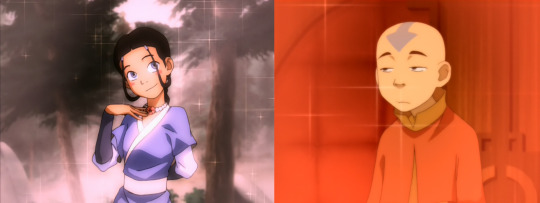
Exhibit B:
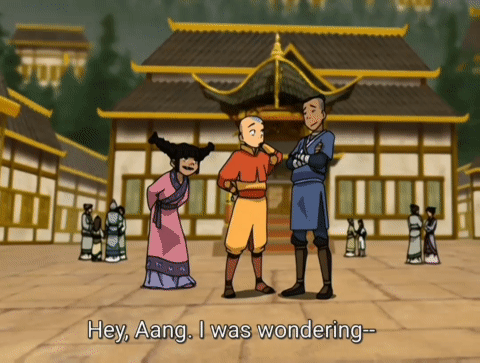
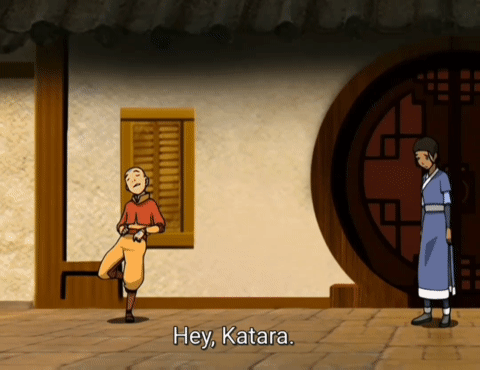
Exhibit C:
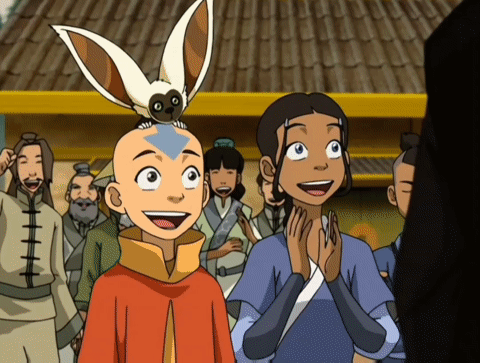
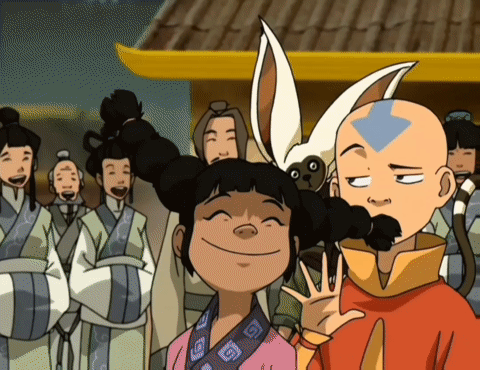
Please note that in exhibits B and C in particular, there is an emphasis on the other party not reciprocating their feelings.
In this parallel the show draws, A\ang is Meng, the younger, shorter one the one who is in love; and Katara is A\ang, the older, taller one who... *checks notes*... doesn't reciprocate.
But in the end, A\ang and Meng have a heart-to-heart.
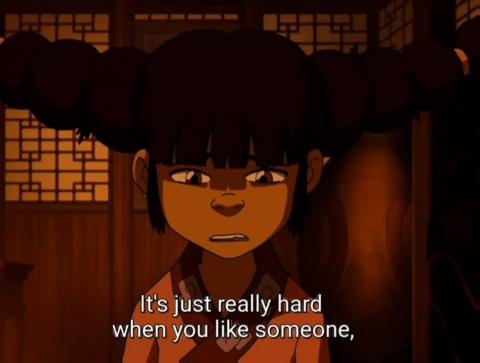
Sometimes you'll like someone, and they aren't going to feel the same way, and even though it's hard, it's okay. They're young, just kids having a crush. A\ang responds to this with "I know what you mean". Because he, just like the audience that watched the parallels, knows that Katara likely doesn't return his feelings.
———————
In conclusion, The Fortuneteller could have been brilliant foreshadowing to Kata\ang not being the endgame couple, and it would have done so through beautiful, mature lessons about first loves and destiny. Thank you for reading.
#anti kataang#zutara#atla critical#anti anti zutara#pro zutara#zutara analysis#zutara evidence#zutara forever#zutara meta#zutara nation#zutara should have been canon#zutar#zutara supremacy#zuko x katara#katara x zuko#katara#meng
107 notes
·
View notes
Text
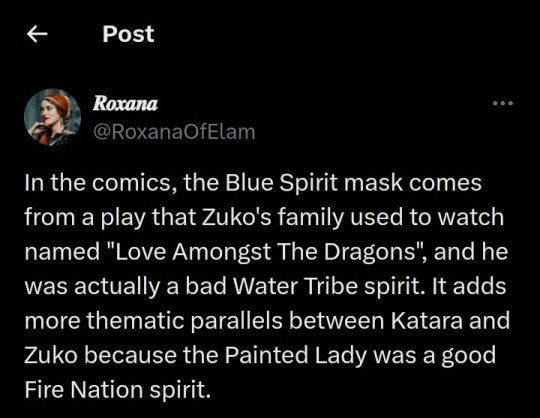
Zutara are parallels in every possible ways, yet they didn't end up together, and other shipper expect me to not upset about it?
2K notes
·
View notes
Text
"Zuko and Katara would argue all the time if they ever had a romantic relationship"
Are
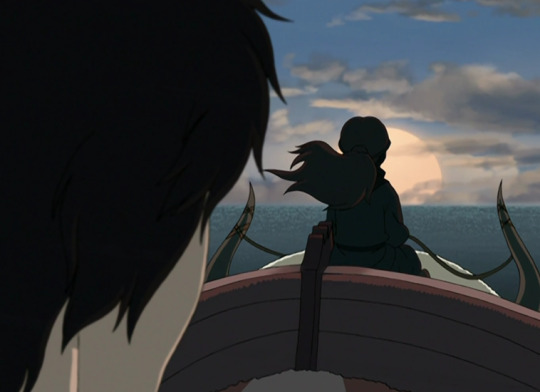
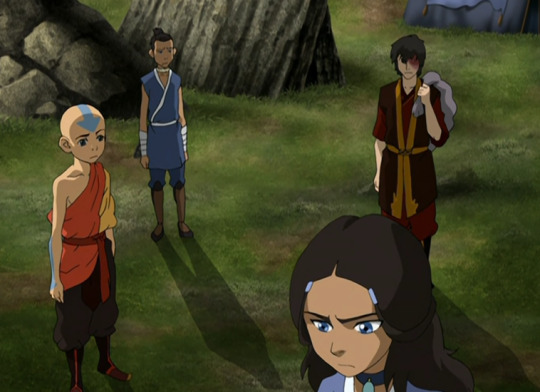
you
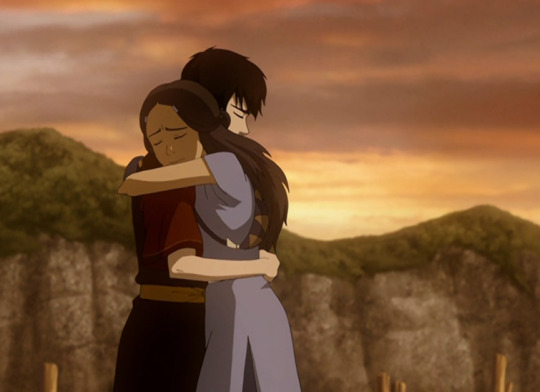

absolutely

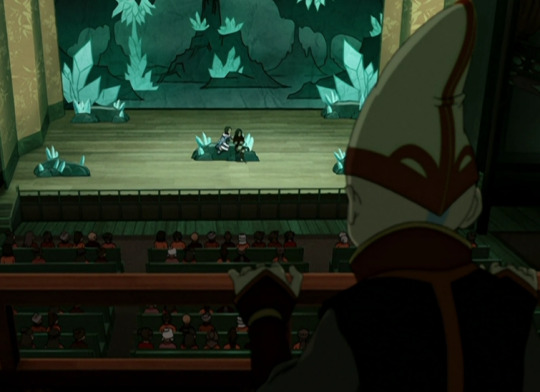
sure
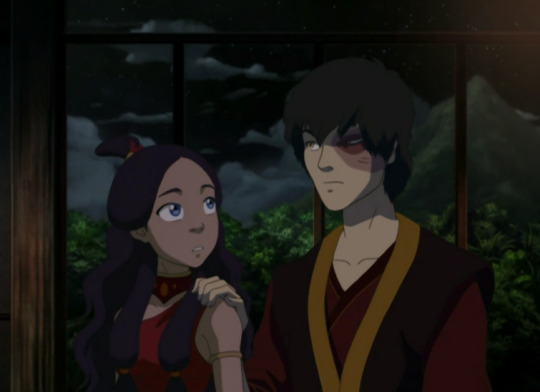
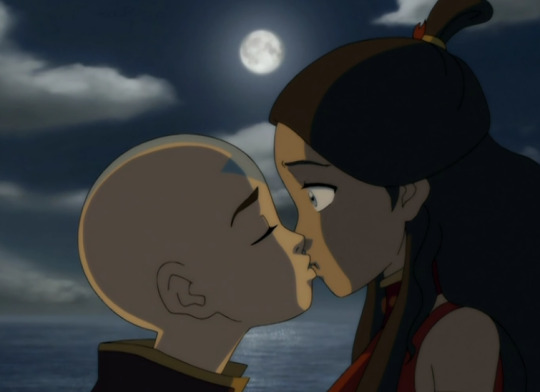
about
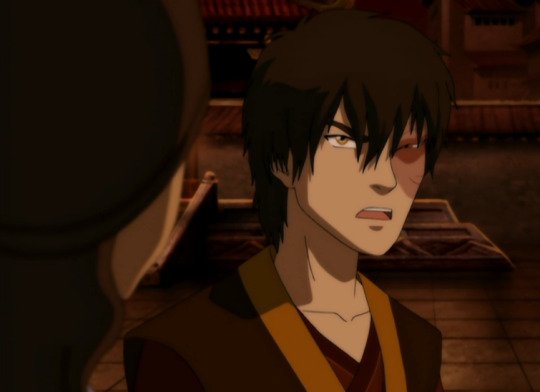
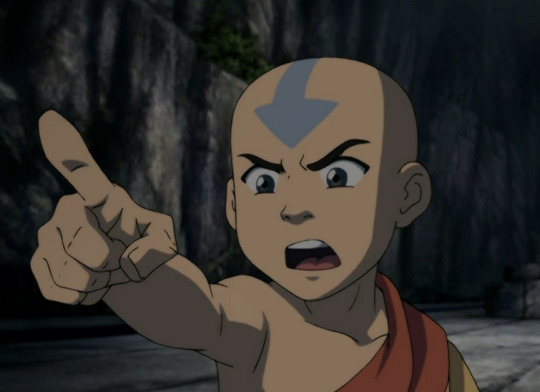
that?
#it seems to me like kataang are the only ones arguing here#except maiko is too so nvm#putting end of book three zutara interactions and end of book 3 kataang interactions side by side is actually eye opening#zutara#anti kataang#anti maiko#anti anti zutara#katara x zuko#zuko x katara#atla#avatar the last airbender
629 notes
·
View notes
Text
The Lightning Scene, How Azula Targeted Katara (of All People), and the Doylist Reason Why That Matters
Mention Zuko's sacrifice for Katara in Sozin's Comet Part 3 as part of a pro-Zutara talking point, and invariably you'll get a Pavlovian response of:
"But Zuko would have taken the lightning for anyone."
(Not to be confused with the similar-sounding Pavlovan response, which is "Zuko's sacrifice ain't shit compared to a mouth-watering, strawberry-topped meringue dessert"*, which is actually the only valid counter-argument to how the lightning scene is a bona fide Zutara treasure, but I digress.)
Now, I've talked in depth about how the lightning scene is framed far more romantically than it had any right to be, regardless of how you might interpret the subject on paper; this is an argument which I still stand by 100%. That Zuko would have gotten barbecued for anyone, and that he was at the stage of his arc where his royal kebab-ness represented his final act of redemption, doesn't change the fact that the animators/soundtrack artists decided to pull out all the stops with making this scene hit romantic film tropes bingo by the time it played out on screen.
(I mean, we stan.)
There's also a deeper level to this conundrum, a layer which creeps up on you when you're standing in your kitchen at night, the fridge door open in front of you, your hungry, sleep-deprived brain trying to decide on what to grab for a midnight snack, and quite inexcusably you're struck with the question: Okay, Zuko may indeed have taken the lightning for just anyone, but would Azula have shot the lightning at just anyone?
But there's yet a deeper layer to this question, that I don't recall ever seeing anyone discuss (though if somebody has, mea culpa). And that is: would you have written Zuko taking the lightning for anyone else?
Or in other words, who Zuko would have taken the lightning for is the wrong question to be asking; the question we ought to be asking is who Zuko should have taken the lightning for, instead.
Get your pens out, your Doylist hats on, and turn to page 394. It's time to think like an author for a hot minute.
(If you don't know what I mean by Watsonian vs. Doylist analyses, and/or if you need a refresher course, go have a skim of the first section of this 'ere post and then scoot your ass back to this one.)
So. You're the author. You've written almost the entirety of an animated series (look at you!!) and now you're at the climax, which you've decided is going to be an epic, hero-villain showdown. Classic. Unlike previous battles between these two characters, your hero is going to have a significant advantage in this fight - partly due to his own development as a hero at the height of his strength and moral conviction, and partly because your villain has gone through a bit of a Britney Spears 2007 fiasco, and isn't quite at the top of her game here. If things keep going at this pace, your hero is going to win the fight fairly easily - actually, maybe even too easily. That's okay though, you're a talented writer and you know just what will raise the stakes and give the audience a well-timed "oh shit" moment: you're going to have the villain suddenly switch targets and aim for somebody else. The hero will be thrown off his groove, the villain will gain the upper hand, the turns will have indubitably tabled. Villains playing dirty is the number 1 rule in every villain handbook after all, and each of the last two times your hero's braved this sort of fight he's faced an opponent who ended up fighting dishonourably, so you've got a lovely Rule of Three perfectly lined up for the taking. Impeccable. The warm glow of triumph shines upon you, cherubs sing, your English teachers clap and shed tears of pride. (Except for that one teacher you had in year 8 who hated everybody, but she's a right bitch and we're not talking about her today.)
Now here's the thing: your hero is a hero. Maybe he wasn't always a hero, but he certainly is one now. If the villain goes after an innocent third party, there's basically no-one your hero wouldn't sacrifice himself for. He's a hero! Heroes do be like that, it's kind of their thing. The villain could shoot a bolt of lightning at Bildad the Shuhite, and the only thing that'd stop our boy Redeemed Paladin Bravesoul McGee from shielding his foxy ass is the fact that Bildad the Shuhite has the audacity to exist in a totally different show (disgusten.)
But. You're holding the writer's pen. Minus crossover shenanigans you don't have the licensing or time-travel technology to achieve, you have full control over how this scene plays out. You get to decide which character to target to deliver the greatest emotional impact, the juiciest angst, the most powerful cinematic suspense. You get to decide whose life you'll put at risk, to make this scene the most intense spine-chilling heart-stopper it can possibly be.
This is the climax we're talking about, after all - now is not the time to go easy on the drama.
So.
Do you make the villain target just anyone?
Or do you make the villain target someone the hero cares about?
Perhaps, someone he cares about... a lot?
Maybe even, someone he cares about... more than anybody else?
You are the author. You are the God of this universe. You get to choose.
What would deliver the strongest punch?
If you happen to make the inadvisable decision of browsing through these tropes on TV tropes, aside from wasting the rest of your afternoon (you're welcome), you'll find that the examples listed are littered with threatened and dead love interests, and, well, there's a reason for that. For better or worse, romantic love is often portrayed by authors, and perceived by audiences, as a "true" form of love (often even, "the" true form of love). Which is responsible for the other is a chicken/egg situation, one I'm not going to go into for this post - and while I'm certainly not here to defend this perspective as objectively good, I do think it's worth acknowledging that it not only exists but is culturally rather ubiquitous. (If you're playing the love interest in a story with a hero v. a villain, you might wanna watch your back, is what I'm saying.)
Regardless of whether the vibe you're aiming for is romantic or platonic however, one thing is for certain: if you want maximum oomph, the way to achieve that is by making the villain go after the player whose death would hit the hero the hardest.
And like I said, this doesn't have to be played romantically (although it so often is). There are platonic examples in those trope pages, though it's also important to note that many of the platonic ones do show up in stories where a love interest isn't depicted/available/there's a strong "bromance" element/the hero is low-key ace - and keep in mind too that going that route sometimes runs a related risk of falling into queer-bait territory *coughJohnLockcough*
That said, if there is a canon love-interest available, one who's confessed her love for the hero, one who has since been imprisoned by the villain, one who can easily be written as being at the villain's disposal, and who could quite conveniently be whipped out for a mid-battle surprise round - you might find you have some explaining to do if you choose to wield your authorly powers to have the villain go after... idk, some other sheila instead.
(The fact that this ends up taking the hero out of the fight, and the person he sacrifices himself for subsequently throws herself into the arena risking life and limb to defeat the villain and rescue her saviour, also means the most satisfying way this plays out, narratively speaking, is if both of these characters happen to be the most important person in each other's lives - at least, as of that moment, anyway - but I think this post has gone on long enough, lol)
This is, by and large, a rebuttal post more than anything else, but the tl;dr here is - regardless of whether you want to read the scene as shippy or not, to downplay Zuko's sacrifice for Katara specifically as "not that deep™" because "Zuko would have taken the lightning for anyone anyway", suggests either that a) nobody should be reading into the implications of Katara being chosen as the person nearest and dearest to Zuko, so that putting her life in jeopardy can deliver the most powerful impact possible for an audience you'd bloody well hope are on the edge of their seats during the climax of your story or b) the writers made the inexplicable decision of having the villain threaten the life of... literally who the fuck ever, and ultimately landed on someone who's actually not all that important to the hero in the grand scheme of things - which is a cardinal writing sin if I ever saw one (even disregarding the Choice to then season it with mood lighting and sad violin music, on top of it all), and altogether something I'd be legitimately pissed about if my Zuko-OTP ship paired him with Mai, Sokka, or just about anybody else 😂
Most importantly c) I'm hungry, and I want snacks.
*The Aussies in the fandom will get this one. Everyone else can suffer in united confusion.
568 notes
·
View notes
Text
“It’s gross if Katara marries Zuko since he’s her colonizer” she overthrew the last Fire Lord to put Zuko on the throne. If anything the Fire Nation would be worried that he’s Katara’s puppet
#“Katara and Zuko are like Pocahontas and John Smith” yeah if Pocahontas toppled the British Empire and made John Smith run it#Trivia: the episode The Puppetmaster foreshadows the geopolitical conflict stemming from the paranoia that Fire Lord Zuko is a puppet king#Especially since palace servants can confirm that he is a simp for Master Katara of the Southern Water Tribe#Tbh installing a ruler in line w your interests is actually a classic colonialism move so she reverse UNO’ed the whole situation#Zutara#pro zutara#anti anti zutara#fire lady katara
708 notes
·
View notes
Text
I love when Toph picks up on the feelings brewing between Zuko and Katara before they completely acknowledge it themselves. Every time someone includes it in a fic it’s just so fun and cute and I’m obsessed, continue doing the lords work guys
#zutara#atla#zuko x katara#Toph shipping Zutara is my head canon#avatar the last airbender#anti anti zutara#zutara fanfic
342 notes
·
View notes
Text
"Zutara is just for fan-girls who self-insert on Katara!"
Well, wouldn't you be shocked and embarrassed to know that I'm a guy and I'm on Zutara's side for reasons that have nothing to do with self-inserting.
You wanna talk about self-inserting? Take a look below.
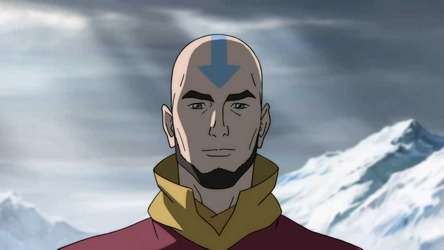

316 notes
·
View notes
Text
Some Zukka shippers need to understand that “Zutara shippers spend so much time arguing that their ship should be canon. Zukka shippers don’t care if our ship is canon or not because we’re above the ship wars” isn’t the sick burn they think it is.
Like YEAH obviously. Zukka is a ship that has almost no standing in canon in the first place. So many Zukka shippers admit that they are drawn towards the dynamic because they just like to see the characters together (there’s nothing wrong with liking a ship for this reason).
But the entire reason that Zutara is still as popular today as it was 15 years ago is because the narrative strongly suggests that it would be canon. If ATLA was a bottle, many Zutara shippers believe that the wrong cap was screwed on in its final moments.
Zukka is a ship that is not backed by the narrative while Zutara is heavily backed by the narrative. So of course our conversations are going to revolve around different topics.
It’s not “above the ship wars” to complain about Zutara shippers gathering too much evidence that our ship should be canon, it’s actually inserting yourself into the ship wars.
#it’s just a dumb argument#good because you wouldn’t be able to win the canon argument anyways#ship whoever tf you want#I don’t care#just stop saying you’re better than us#cause we like to talk about the canonical potential of our ship#zutara#pro zutara#anti anti zutara#anti zukka#anti zukka shippers#atla
300 notes
·
View notes
Text
anti zutaras with zuko & the rest of the gaang: zuko smiled at aang👬 💕 zuko & sokka comedy duo 🤣💑 zuko & toph softies 💖🫂
also anti zutaras with zuko & katara: how dare you 🤬🤬🤬 zuko colonizer ❌️❌️❌️ katara victim 😡😡😡 bad 👎👎👎 abusive 👎👎👎 toxic 👹 GRAAAAAAAH
230 notes
·
View notes
Text
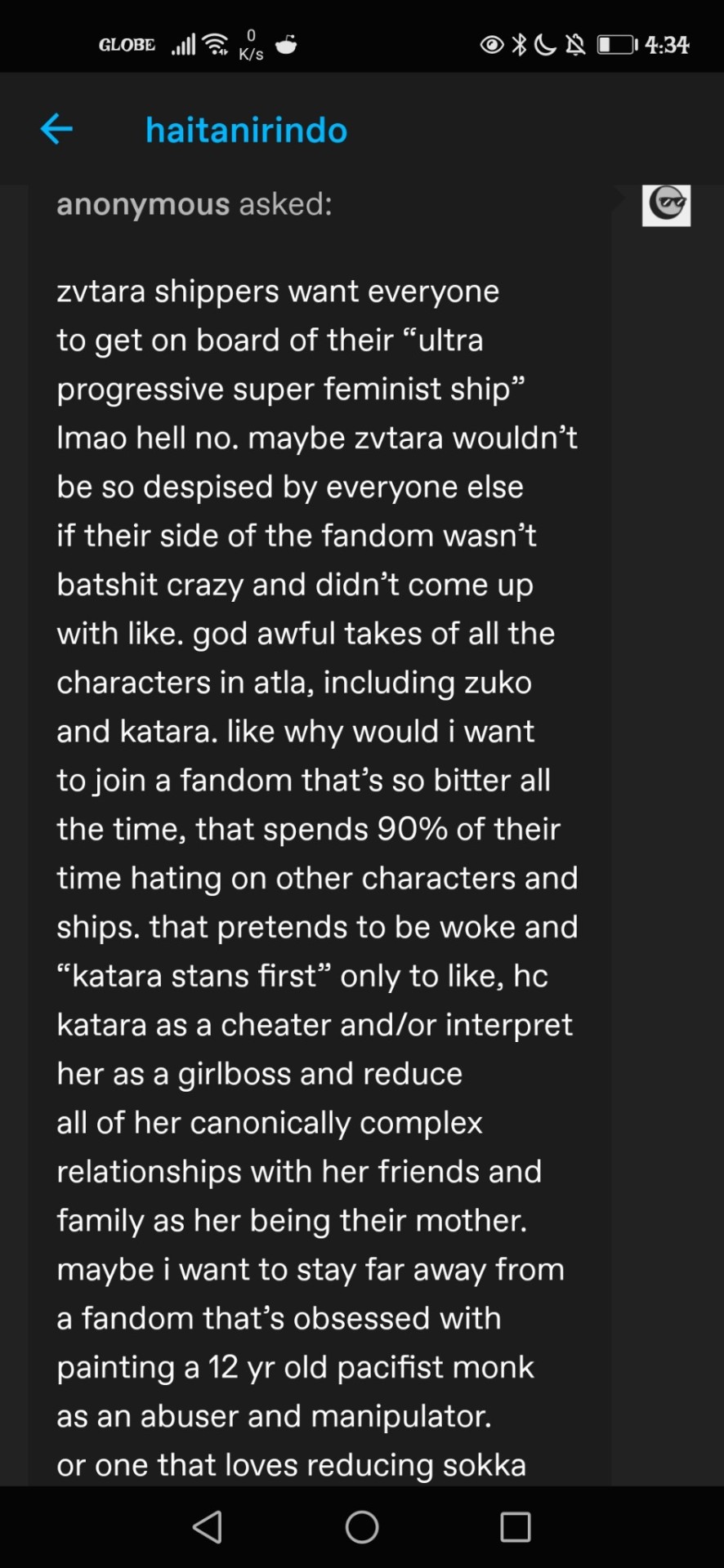
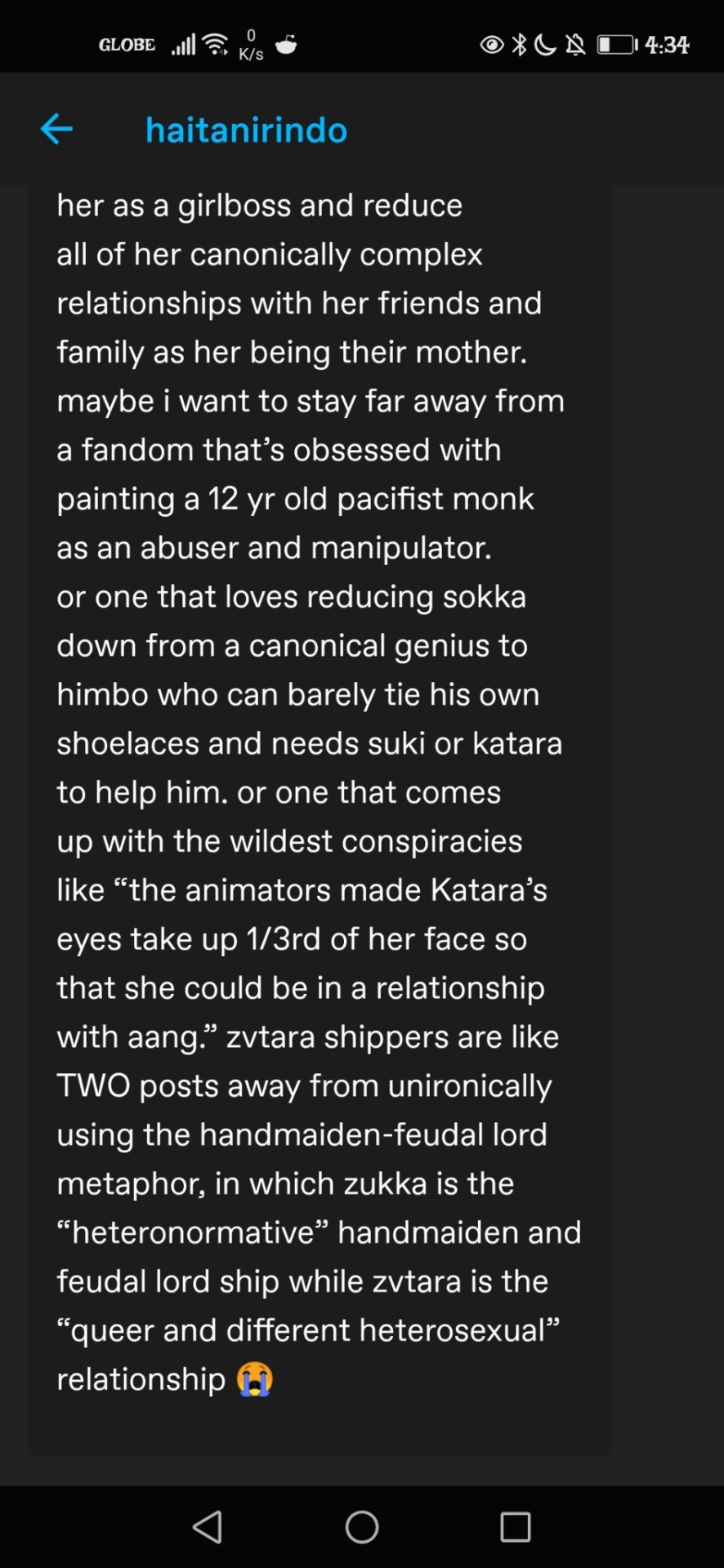
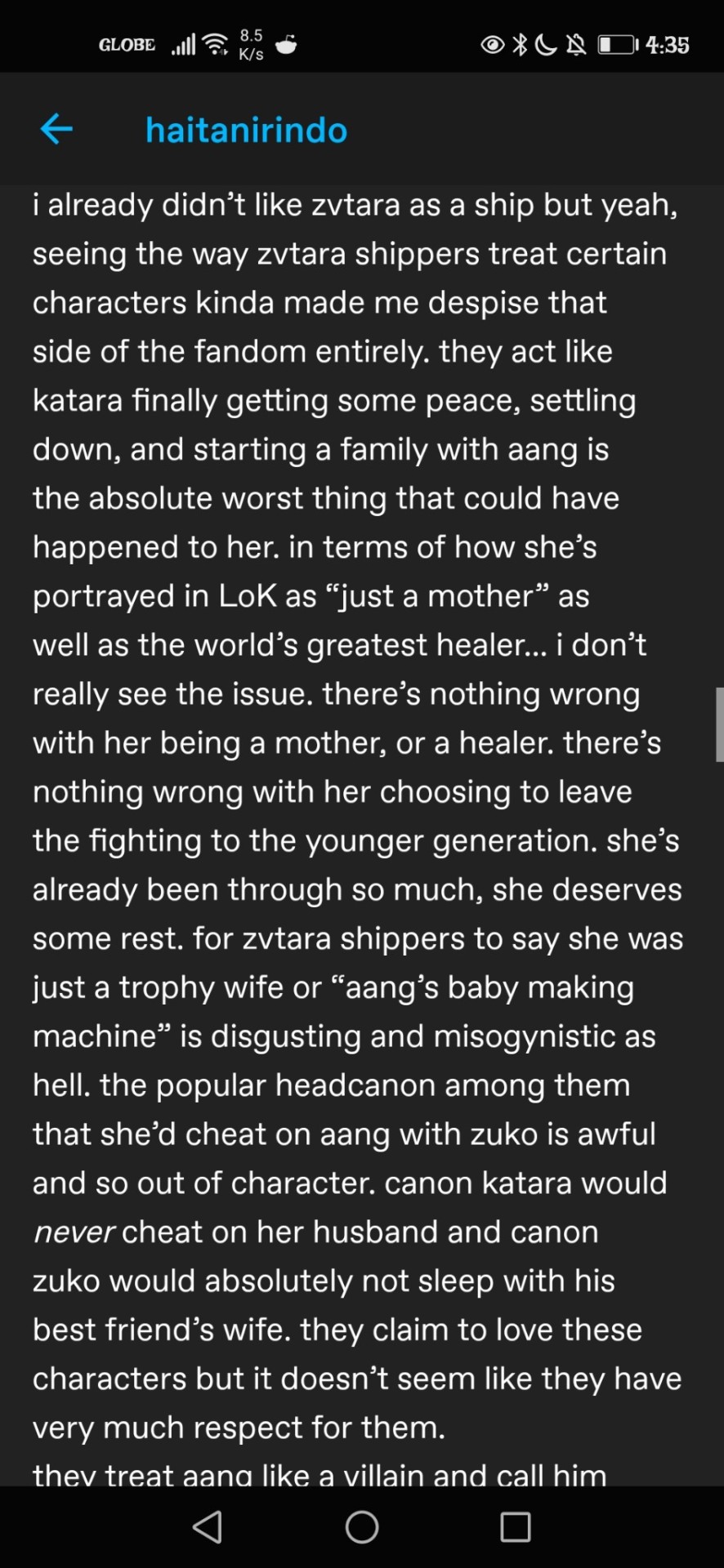
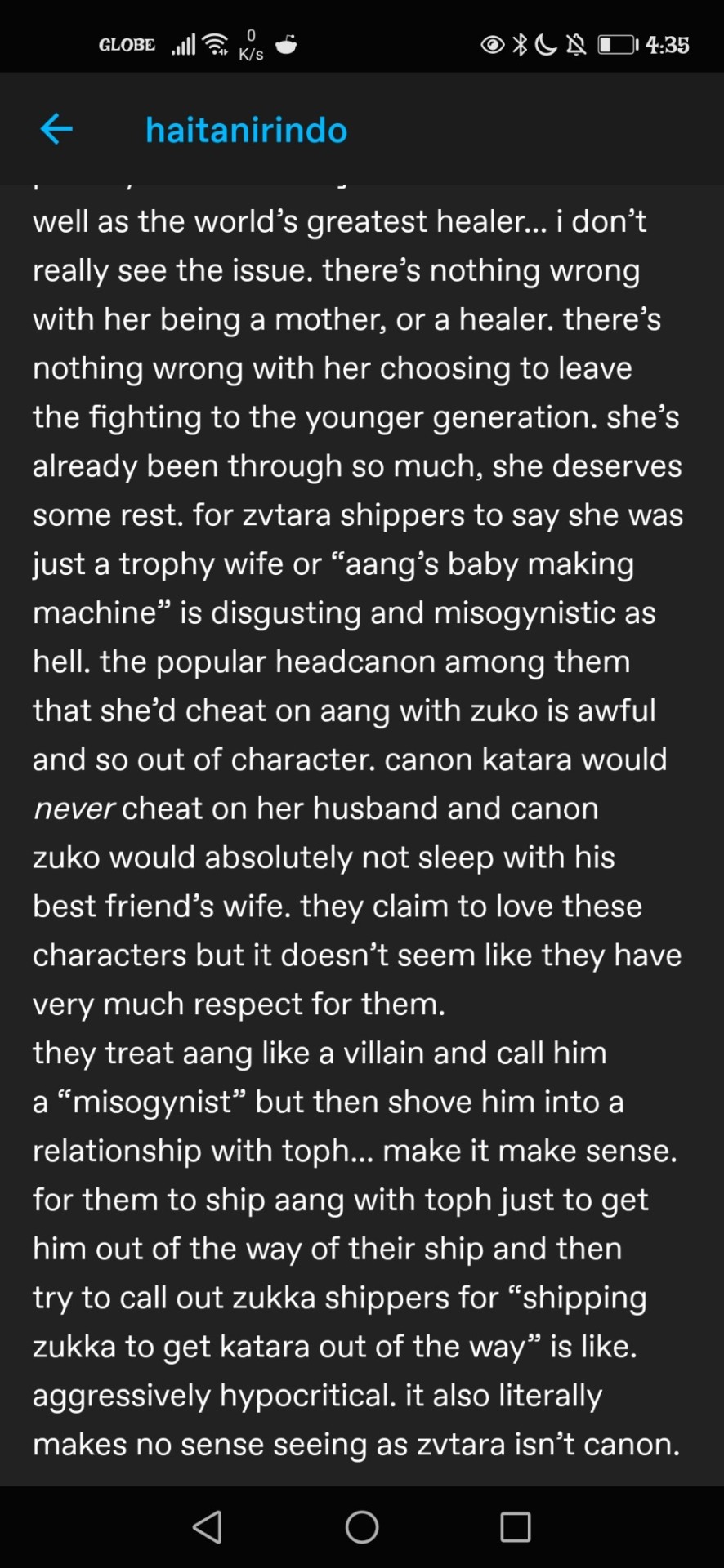
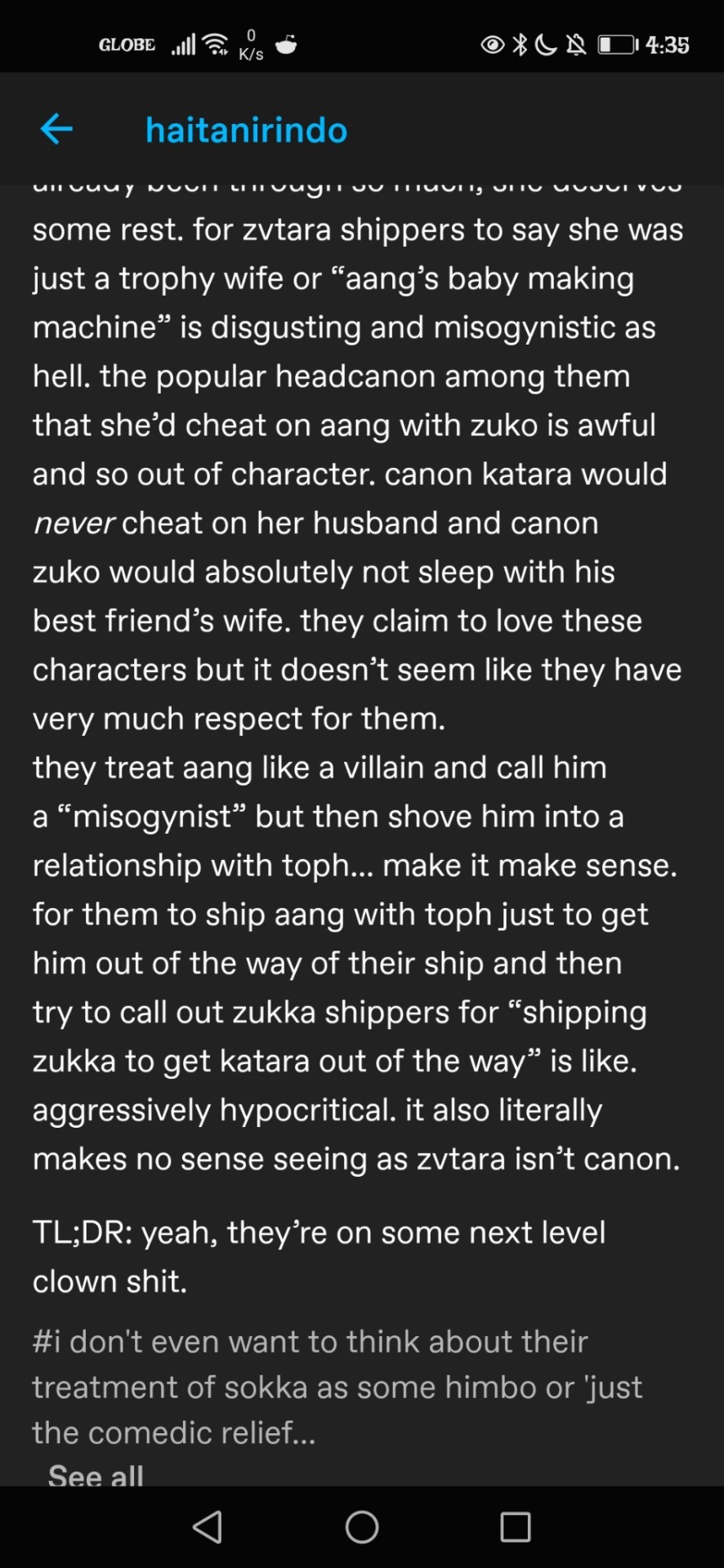
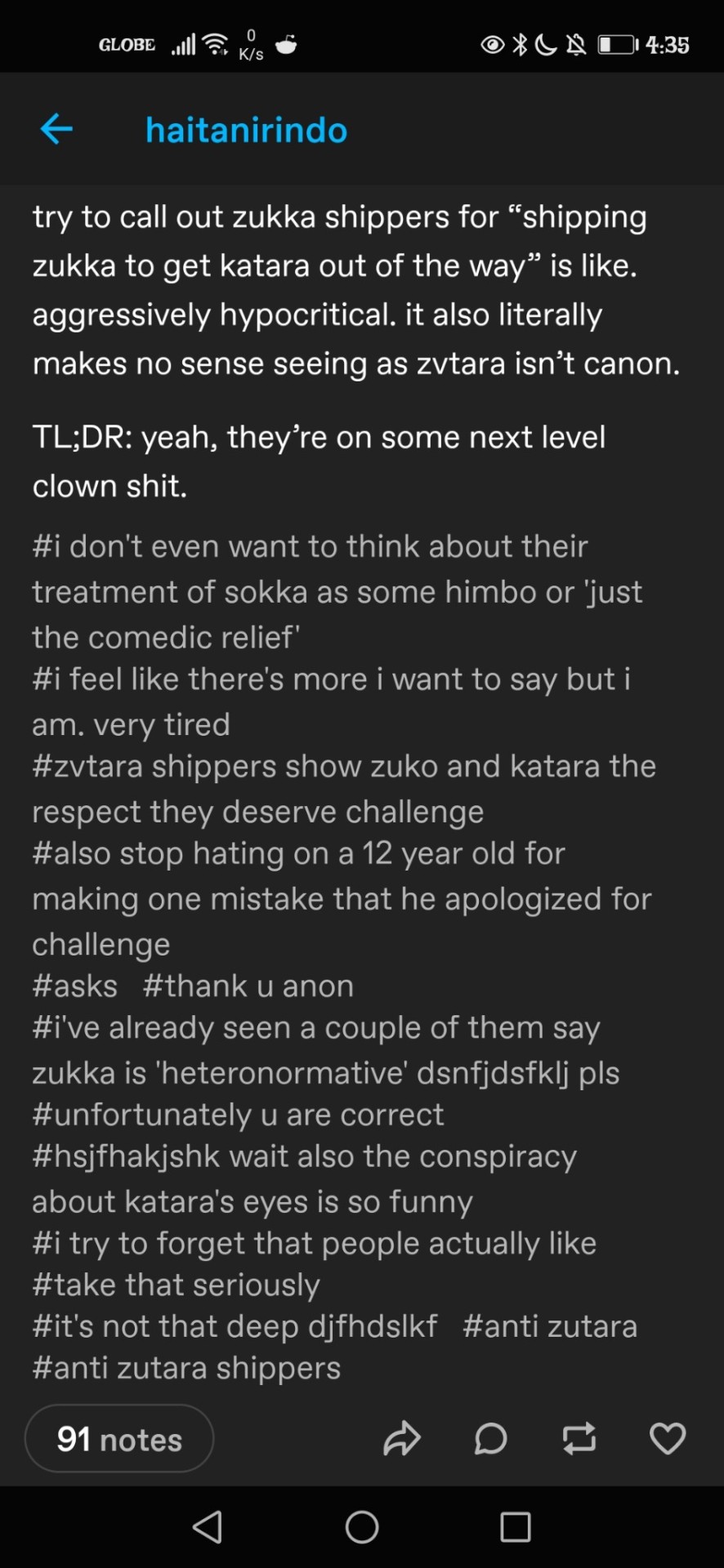
Zutarians i lowkey wanna see some of your responses and debunks by this post 😭😭💀
#zutara#zuko x katara#atla zutara#that's a whole long ass post that i've ever seen ig#💀😭 btw this was from 2021#should i tag this as anti anti zutara?#idk#anti anti zutara#sorry some screenshots seem to not be in order tho 💀💀😭
164 notes
·
View notes
Text
THE WATER TRIBES WERE NOT COLONIES OF THE FIRE NATION. THE WATER TRIBES WERE NOT COLONIES OF THE FIRE NATION. THE WATER TRIBES NEVER WERE AND ARE NOT COLONIES OF THE FIRE NATION.
There. I said it. Hope it clears up for the dumb people.
172 notes
·
View notes
Text
My Interpetation of The Southern Raiders: Part 1 – A\ang
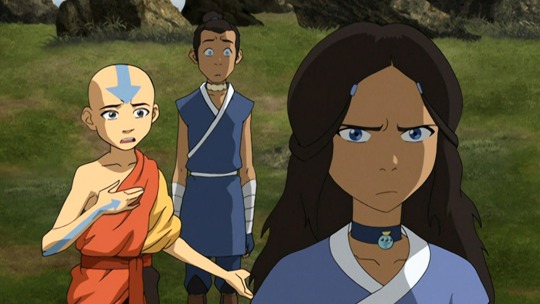
Warning: The views expressed in this analysis will be very critical of Aang. If you aren't critical of him in this episode, you aren't going to enjoy this post. This is your chance to leave. I probably won't have a debate for personal reasons.
——————
The Southern Raiders is probably one of the most discussed episodes in the fandom. Everyone knows Zuko Alone is great, but the discussion surrounding this episode is a war zone. In this essay I will try to answer every question posed in the discourse. This is part 1 out of three. In this part, I will discuss A\ang. I believe that understanding both Zuko and Aang's decisions in this episode will give us great insight into Katara's. Because the this episode is hers.
——————
1. Is Aang's philosophy of forgiveness valid?
(1) "Revenge is like a two-headed rat viper. While you watch your enemy go down, you're being poisoned yourself".
(2) "You do have a choice: forgiveness". // "It's easy to do nothing, but it's hard to forgive". // "Forgiveness is the first step you have to take to begin healing".
This philosophy is indeed morally sound. Revenge comes from rage, a negative emotion that causes harm in the long run. Forgiveness is letting go of that rage, which is healing. I cannot write a full thesis, this essay is not about that. But on paper, I do agree with A\ang. He's right to say that letting go of rage is a better alternative than getting consumed by it. (However, his philosophy might not help some).
——————
2. Was A\ang being insensitive when talking to Katara?
First I must reiterate, a lot of people frame the conflict of the episode as one regarding the ethics of murder. In my interpretation, it is not. During this episode Katara was in a deeply emotional place. Her rage stemmed from intense grief and those around her should treat her as a mourner - with great sensitivity.
Now, was Aang being this sensitive with Katara? Well, in my opinion, very much so.
Imagine a scenario where A\ang just happens to meet Haru, and he's about to go on a quest to find revenge on who imprisoned his father. He tries to help him with the following sentences:
(1) Um ... and what exactly do you think this will accomplish?
(2) Wait! Stop! I do understand. You're feeling unbelievable pain and rage. How do you think I felt about the sandbenders when they stole Appa? How do you think I felt about the Fire Nation when I found out what happened to my people?
(3) I don't think so. I think it's about getting revenge.
(4) Haru, you sound like Jet.
(5) The monks used to say that revenge is like a two-headed rat viper. While you watch your enemy go down, you're being poisoned yourself.
(6) Haru, you do have a choice: forgiveness.
(7) No, it's not. It's easy to do nothing, but it's hard to forgive.
(8) You did the right thing. Forgiveness is the first step you have to take to begin healing.
Everything makes sense, right? The pieces fit.He just talks about his cultura\personal values, nothing about what Katara needs at the moment. He could have had this exact conversation with Haru without changing a thing.
Therefore his lines are impersonal and thus preachy. In this conversation he doesn’t show signs of trying to convince Katara not to end her mother’s killer because she is, fundamentally, a good person and couldn’t live having committed murder. He shows signs of trying to make her obey his cultural ethos. This is highly insensitive. Katara was in a very emotional place, filled with rage and grief. And his response was, intentionally or not, to impose his own cultural principles onto her.
But his lines weren’t insensitive just because they were preachy, some of them were judgmental and even harsh. When A\ang is first confronted with Katara’s intentions, he says:
A\ang: Um ... and what exactly do you think this will accomplish?
You can tell from his tone and how the rest of the conversation plays out that he does know what Katara thinks this will accomplish. He asks the question as a form of disapproval - that he thinks that going after Yon Rha won’t accomplish anything. He’s not being genuine, he’s casting judgment on her. He’s almost looking down on her and Zuko, looking down from a moral high ground and sarcastically interrogating the two. Another line that sticks out is
A\ang: Katara, you sound like Jet.
He says she sounds like the man who wanted to flood an entire village full of innocent civilians. He’s insulting her, and greatly so, all the while wanting to keep a moral high ground. This is incredibly rude and condescending.
In the next scene, right after the intense argument concludes, it appears as though A\ang comes around to the journey Katara was about to go through.
A\ang: I wasn't planning to. This is a journey you need to take. You need to face this man.But when you do, please don't choose revenge. Let your anger out, and then let it go. Forgive him.
While he’s still discouraging Katara, it’s not outright condescending. But it’s as clear as day that he’d just preferred if she didn’t go on the journey at all. When he sees Zuko and Katara taking Appa to find Yon Rha, he says:
A\ang: So you were just gonna take Appa anyway?
Clearly disapproving of Katara. He doesn’t want her to go on the journey to find inner peace, he wants her to forgive the man who killed her mother right here and right now. He couldn’t change her mind on the subject, so he’ll advise her the next best thing. It is worth noting that in the beginning, before he advises her, he cracks a joke.
A\ang: It's okay, because I forgive you. [Pauses.] That give you any ideas?
Overall, A\ang’s behavior is unsympathetic and callous.Instead of placing his focus on Katara’s wellbeing, he preaches about Air Nomad teachings and goes as far as insulting her. Even when he comes around, it’s not because he realized his mistakes, it’s because he knew he couldn’t change her mind. And then he makes a humorous remark while giving him his supposed new found advice. The answer is: Yes. Aang was very insensitive when talking to Katara.
——————
3. Did A\ang know what Katara needed?
I don’t think he did. A\ang thought Katara needed to forgive Yon Rha, and as we previously established, without going after him. But even if we look at his second advice, she still doesn’t follow it.
A\ang: This is a journey you need to take. You need to face this man. [Katara situates herself on Appa's head.] But when you do, please don't choose revenge. Let your anger out, and then let it go. Forgive him.
Katara explicitly didn’t forgive Yon Rha, and yet the whole point of the ending is that she’s in a better place now. No matter what Zuko says, A\ang didn’t know what Katara needed. And considering that his lines in the episode were as impersonal as they were, it isn’t a surprise.
——————
In conclusion, A\ang’s behavior in The Southern Raiders is questionable at best. He might have had pure intentions, and had a good message, but the way he put out the message was degrading and preachy. And in the end, he didn’t know what was the right thing for Katara.
#2. taking over and becoming its own meta lol#also “katara spared yon rha bcs of ang” will be discussed in part 3#anti aang#anti kataang#zutara#<- tagging for reach#atla critical#zuko x katara#katara x zuko#anti anti zutara#pro zutara#zutara analysis#zutara evidence#zutara forever#zutara meta#zutara should have been canon#zutara nation#zutara supremacy#zutara was robbed#zutarian
32 notes
·
View notes
Text
Thank you for Fortnite and whoever posted this 'married Zutara life' first on Twitter. This is so loving (especially the last one) 💕 I'm screaming!!!
#pro zutara#zutara#anti anti zutara#zuko x katara#zuko and katara#fortnite zuko katara bundle#atla zutara#zutara married life#zutara was robbed
558 notes
·
View notes
Text
Accidentally glanced at an anti post and apparently zutarians analyzing the show is annoying now. Antis are literally ridiculous I can't even.
#analysis is part of being in a fandom sorry#like you don't have to engage with it but its ridiculous to say that giving reasons for shipping something is “annoying”#atla#avatar the last airbender#zutara#anti kataang#anti anti zutara
191 notes
·
View notes
Text
Why I Deliberately Avoided the "Colonizer" Argument in my Zutara Thesis - and Why I'll Continue to Avoid it Forever
This is a question that occasionally comes up under my Zutara video essay, because somehow in 2 hours worth of content I still didn't manage to address everything (lol.) But this argument specifically is one I made a point of avoiding entirely, and there are some slightly complicated reasons behind that. I figure I'll write them all out here.
From a surface-level perspective, Zuko's whole arc, his raison d'etre, is to be a de-colonizer. Zuko's redemption arc is kinda all about being a de-colonizer, and his redemption arc is probably like the most talked about plot point of ATLA, so from a basic media literacy standpoint, the whole argument is unsound in the first place, and on that basis alone I find it childish to even entertain as an argument worth engaging with, to be honest.
(At least one person in my comments pointed out that if any ship's "political implications" are problematic in some way, it really ought to be Maiko, as Mai herself is never shown or suggested to be a strong candidate for being a de-colonizing co-ruler alongside Zuko. If anything her attitudes towards lording over servants/underlings would make her… a less than suitable choice for this role, but I digress.)
But the reason I avoided rebutting this particular argument in my video goes deeper than that. From what I've observed of fandom discourse, I find that the colonizer argument is usually an attempt to smear the ship as "problematic" - i.e., this ship is an immoral dynamic, which would make it problematic to depict as canon (and by extension, if you ship it regardless, you're probably problematic yourself.)
And here is where I end up taking a stand that differentiates me from the more authoritarian sectors of fandom.
I'm not here to be the fandom morality police. When it comes to lit crit, I'm really just here to talk about good vs. bad writing. (And when I say "good", I mean structurally sound, thematically cohesive, etc; works that are well-written - I don't mean works that are morally virtuous. More on this in a minute.) So the whole colonizer angle isn't something I'm interested in discussing, for the same reason that I actually avoided discussing Katara "mothering" Aang or the "problematic" aspects of the Kataang ship (such as how he kissed her twice without her consent). My whole entire sections on "Kataang bad" or "Maiko bad" in my 2 hour video was specifically, "how are they written in a way that did a disservice to the story", and "how making them false leads would have created valuable meaning". I deliberately avoided making an argument that consisted purely of, "here's how Kataang/Maiko toxic and Zutara wholesome, hence Zutara superiority, the end".
Why am I not willing to be the fandom morality police? Two reasons:
I don't really have a refined take on these subjects anyway.
Unless a piece of literature or art happens to touch on a particular issue that resonates with me personally, the moral value of art is something that doesn't usually spark my interest, so I rarely have much to say on it to begin with. On the whole "colonizer ship" subject specifically, other people who have more passion and knowledge than me on the topic can (and have) put their arguments into words far better than I ever could. I'm more than happy to defer to their take(s), because honestly, they can do these subjects justice in a way I can't. Passing the mic over to someone else is the most responsible thing I can do here, lol.
But more importantly:
I reject the conflation of literary merit with moral virtue.
It is my opinion that a good story well-told is not always, and does not have to be, a story free from moral vices/questionable themes. In my opinion, there are good problematic stories and bad "pure" stories and literally everything in between. To go one step further, I believe that there are ways that a romance can come off "icky", and then there are ways that it might actually be bad for the story, and meming/shitposting aside, the fact that these two things don't always neatly align is not only a truth I recognise about art but also one of those truths that makes art incredibly interesting to me! So on the one hand, I don't think it is either fair or accurate to conflate literary "goodness" with moral "goodness".
On a more serious note, I not only find this type of conflation unfair/inaccurate, I also find it potentially dangerous - and this is why I am really critical of this mindset beyond just disagreeing with it factually. What I see is that people who espouse this rhetoric tend to encourage (or even personally engage in) wilful blindness one way or the other, because ultimately, viewing art through these lens ends up boxing all art into either "morally permissible" or "morally impermissible" categories, and shames anyone enjoying art in the "morally impermissible" box. Unfortunately, I see a lot of people responding to this by A) making excuses for art that they guiltily love despite its problematic elements and/or B) denying the value of any art that they are unable to defend as free from moral wickedness.
Now, I'm not saying that media shouldn't be critiqued on its moral virtue. I actually think morally critiquing art has its place, and assuming it's being done in good faith, it absolutely should be done, and probably even more often than it is now.
Because here's the truth: Sometimes, a story can be really good. Sometimes, you can have a genuinely amazing story with well developed characters and powerful themes that resonate deeply with anyone who reads it. Sometimes, a story can be all of these things - and still be problematic.*
(Or, sometimes a story can be all of those things, and still be written by a problematic author.)
That's why I say, when people conflate moral art with good art, they become blind to the possibility that the art they like being potentially immoral (or vice versa). If only "bad art" is immoral, how can the art that tells the story hitting all the right beats and with perfect rhythm and emotional depth, be ever problematic?
(And how can the art I love, be ever problematic?)
This is why I reject the idea that literary merit = moral virtue (or vice versa) - because I do care about holding art accountable. Even the art that is "good art". Actually, especially the art that is "good art". Especially the art that is well loved and respected and appreciated. The failure to distinguish literary critique from moral critique bothers me on a personal level because I think that conflating the two results in the detriment of both - the latter being the most concerning to me, actually.
So while I respect the inherent value of moral criticism, I'm really not a fan of any argument that presents moral criticism as equivalent to literary criticism, and I will call that out when I see it. And from what I've observed, a lot of the "but Zutara is a colonizer ship" tries to do exactly that, which is why I find it a dishonest and frankly harmful media analysis framework to begin with.
But even when it is done in good faith, moral criticism of art is also just something I personally am neither interested nor good at talking about, and I prefer to talk about the things that I am interested and good at talking about.
(And some people are genuinely good at tackling the moral side of things! I mean, I for one really enjoyed Lindsay Ellis's take on Rent contextualising it within the broader political landscape at the time to show how it's not the progressive queer story it might otherwise appear to be. Moral critique has value, and has its place, and there are definitely circumstances where it can lead to societal progress. Just because I'm not personally interested in addressing it doesn't mean nobody else can do it let alone that nobody else should do it, but also, just because it can and should be done, doesn't mean that it's the only "one true way" to approach lit crit by anyone ever. You know, sometimes... two things… can be true… at once?)
Anyway, if anyone reading this far has recognised that this is basically a variant of the proship vs. antiship debate, you're right, it is. And on that note, I'm just going to leave some links here. I've said about as much as I'm willing/able to say on this subject, but in case anyone is interested in delving deeper into the philosophy behind my convictions, including why I believe leftist authoritarian rhetoric is harmful, and why the whole "but it would be problematic in real life" is an anti-ship argument that doesn't always hold up to scrutiny, I highly recommend these posts/threads:
In general this blog is pretty solid; I agree with almost all of their takes - though they focus more specifically on fanfic/fanart than mainstream media, and I think quite a lot of their arguments are at least somewhat appropriate to extrapolate to mainstream media as well.
I also strongly recommend Bob Altemeyer's book "The Authoritarians" which the author, a verified giga chad, actually made free to download as a pdf, here. His work focuses primarily on right-wing authoritarians, but a lot of his research and conclusions are, you guessed it, applicable to left-wing authoritarians also.
And if you're an anti yourself, welp, you won't find support from me here. This is not an anti-ship safe space, sorrynotsorry 👆
In conclusion, honestly any "but Zutara is problematic" argument is one I'm likely to consider unsound to begin with, let alone the "Zutara is a colonizer ship" argument - but even if it wasn't, it's not something I'm interested in discussing, even if I recognise there are contexts where these discussions have value. I resent the idea that just because I have refined opinions on one aspect of a discussion means I must have (and be willing to preach) refined opinions on all aspects of said discussion. (I don't mean to sound reproachful here - actually the vast majority of the comments I get on my video/tumblr are really sweet and respectful, but I do get a handful of silly comments here and there and I'm at the point where I do feel like this is something worth saying.) Anyway, I'm quite happy to defer to other analysts who have the passion and knowledge to give complicated topics the justice they deserve. All I request is that care is taken not to conflate literary criticism with moral criticism to the detriment of both - and I think it's important to acknowledge when that is indeed happening. And respectfully, don't expect me to give my own take on the matter when other people are already willing and able to put their thoughts into words so much better than me. Peace ✌
*P.S. This works for real life too, by the way. There are people out there who are genuinely not only charming and likeable, but also generous, charitable and warm to the vast majority of the people they know. They may also be amazing at their work, and if they have a job that involves saving lives like firefighting or surgery or w.e, they may even be the reason dozens of people are still alive today. They may honestly do a lot of things you'd have to concede are "good" deeds.
They may be all of these things, and still be someone's abuser. 🙃
Two things can be true at once. It's important never to forget that.
#zutara discourse#the colonizer argument#anti anti zutara#text post#long post#anti maiko#anti mai#tagging just in case#anti purity culture#this is not an anti-ship safe space
259 notes
·
View notes
Text
on “Zutara is a colonizer x colonized ship”
“Colonizer” is not an ontological category. It’s a role within a specific geopolitical power dynamic, and therefore it can change — or even cease to exist — when these geopolitical power dynamics change (like when, idk, a Gaang of teenagers overthrow a genocidal imperialist colonial regime to install a new monarch who vows to stop the genocide and imperialism and colonization and bring about an era of love and peace)
I know it’s a bad faith anti argument, but it bothers me more than most anti Zutara arguments because I think it is indicative of a very pessimistic, defeatist attitude about power relations in general. Any type of oppressor is not a fixed role. It’s subject to change, and indeed ATLA’s message is that it’s your obligation — and your right, your power — to fight for that change, even if you’re just a ragtag group of kids against a whole empire. Calling Zuko a colonizer is not only a baffling misunderstanding of what colonization is, it also implies that even when you successfully challenge and restructure oppressive power dynamics, old sins cast long enough shadows that there is nothing you can do to be free of them. It’s one thing to acknowledge the complexities of a close relationship with someone who used to benefit from your oppression (indeed that’s kind of the whole arc of The Southern Raiders where Katara confronts the ways in which she has projected the trauma of her mother’s murder at the hands of the Fire Nation onto Zuko, who is now a valued ally). It’s quite another to claim that neither of you can ever escape the ontological categories of oppressor vs victim even if you’ve both changed the world.
#Also the water tribes were never even fucking colonies so even the premise is wrong but other folks have talked about that#The colonizer does not exist without the colonized that’s like anticolonialism 101#source: my anticolonialism seminar where I first read The Colonizer and the Colonized#Zutara#Zutara meta#atla fandom critical#Pro Zutara#anti anti Zutara#look what the antis made me do they made me type anti twice#my meta#ATLA colonization discourse#which apparently warrants a tag now lmao
223 notes
·
View notes